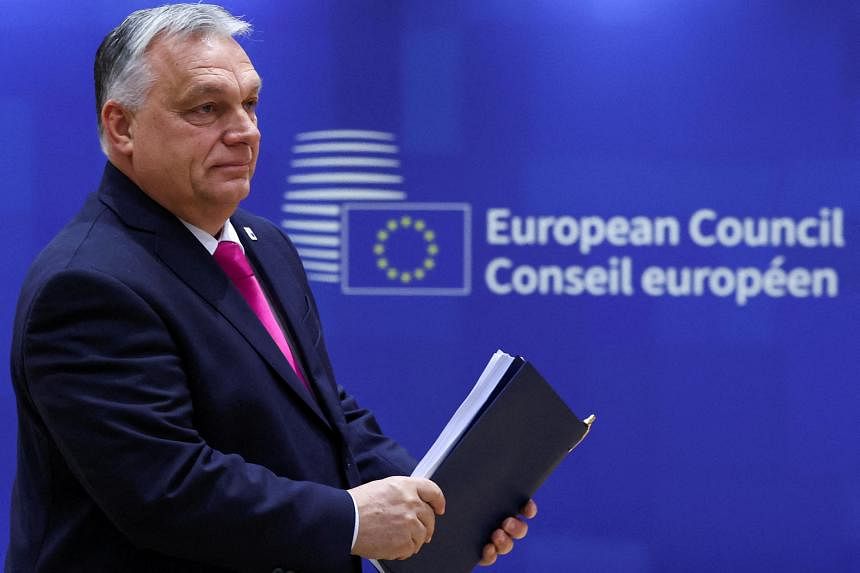BRUSSELS - European Union leaders will meet in Brussels on Feb 1 to try again to agree on granting Ukraine new financial aid as Kyiv fights against Russia's invasion.
In December, Hungary vetoed extending €50 billion (S$70 billion) to Ukraine via the EU budget through 2027.
The bloc's chief executive this week sounded confident there would be a deal among all 27 member states.
Hungarian Prime Minister Viktor Orban has made comments suggesting an agreement was possible, although his chief of staff said on Jan 18 that Budapest and the EU remained far apart.
Following are some options for a deal being considered in the EU's political hub Brussels, and how they are viewed in the Hungarian capital:
Deal among all 27 Eu nations, within joint budget
The EU's "Plan A" until Mr Orban struck it down in December. He has since said he would veto it again.
That option includes a revision of the bloc's joint 2024-27 budget to assign €50 billion in new aid to Ukraine.
Mr Orban has spoken against committing money for years in advance while the situation in Ukraine is highly unpredictable. He has said supporting Kyiv must not "harm" the EU budget.
All EU countries contribute to central coffers according to their size and wealth. The budget is run by the EU executive, the Brussels-based European Commission. It has said this option would give Ukraine crucial longer-term financial predictability.
Deal among the 27, outside of EU budget
An option seen as second-best in Brussels is committing funds through a special financial vehicle created by all the 27 member states - but outside of their shared budget.
It could be formed by member states providing more financial guarantees for the EU, against which the Commission would borrow cheaply on the market.
This is how the bloc provided €18 billion to Ukraine in 2023, a deal that Mr Orban initially also blocked. This time around, Budapest said it was against taking loans for Ukraine.
But Mr Orban welcomed placing assistance to Ukraine outside of the joint coffers by saying on social media: "The Commission's plan B is the Hungarian plan A!".
Budapest wants commitments based on countries' gross national income and assistance to Kyiv agreed annually.
That would give Ukraine less predictability and reinforce the threat of a Hungarian veto every time.
26 move ahead without Hungary
Mindful of that, the other 26 EU countries are also looking at moving ahead without Hungary, a message to Mr Orban that his obstruction has its limits.
That could take the form of the 26 states agreeing to extend support to Kyiv but each doing so on its own. Such a formula would be more complicated and expensive, however, as well as less stable than acting together under the EU umbrella.
It would also expose a major rift within the bloc over Russia's invasion of Ukraine, weakening EU cohesion and the message it wants to send to Moscow by providing continued support to Kyiv.
Upset still possible
Officials in Brussels have expressed cautious optimism that the Feb 1 EU leaders' summit will reach an agreement. Officials in Budapest also said they expect the meeting to be conclusive.
While that makes an upset seem less likely than a deal of some kind, EU watchers always keep an eye out for any unexpected development that changes the calculus at the last minute.
Implications for EU funds for Hungary
While formally separate, the discussion overlaps with an ever-more bitter feud over the rule of law in Hungary between the EU and Mr Orban.
Brussels suspended tens of billions in EU handouts earmarked for Hungary over widespread accusations that Mr Orban damaged democracy at home during his 13 years in power.
In December, the Commission unlocked some €10 billion of that as the bloc sought to win Mr Orban's backing for Ukraine.
Around twice as much remains frozen, including in connection with Budapest's curbs on the rights of migrants and LGBT people. Hungarian officials said adopting EU democratic requirements in these fields was "far beyond the red line". REUTERS

